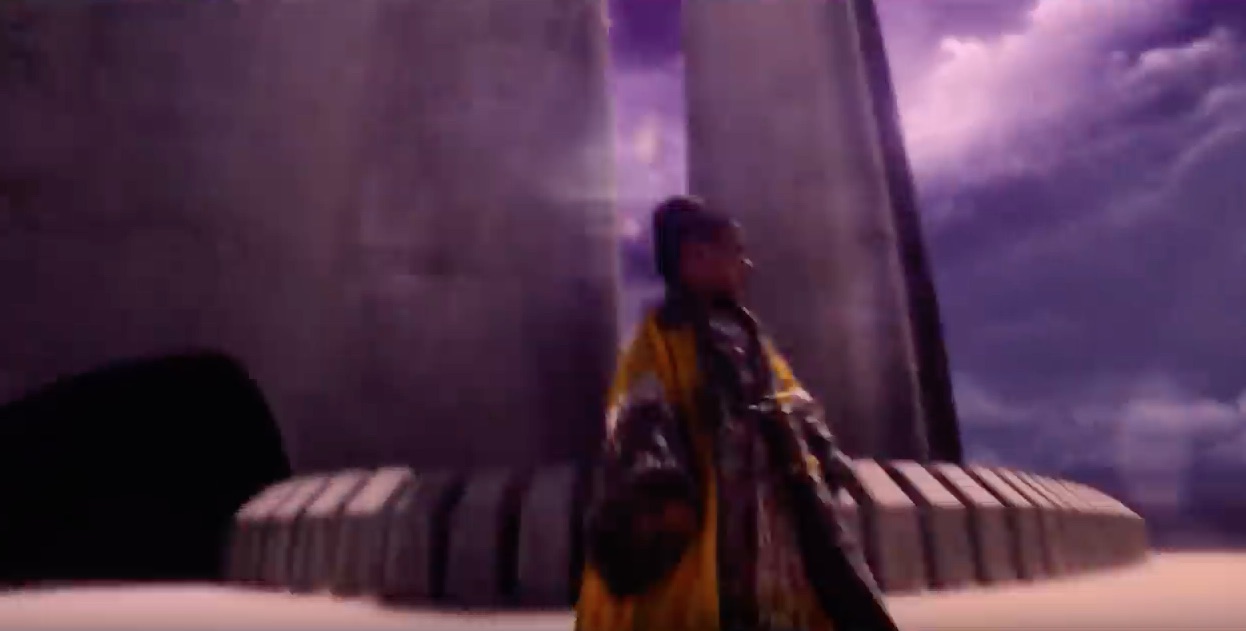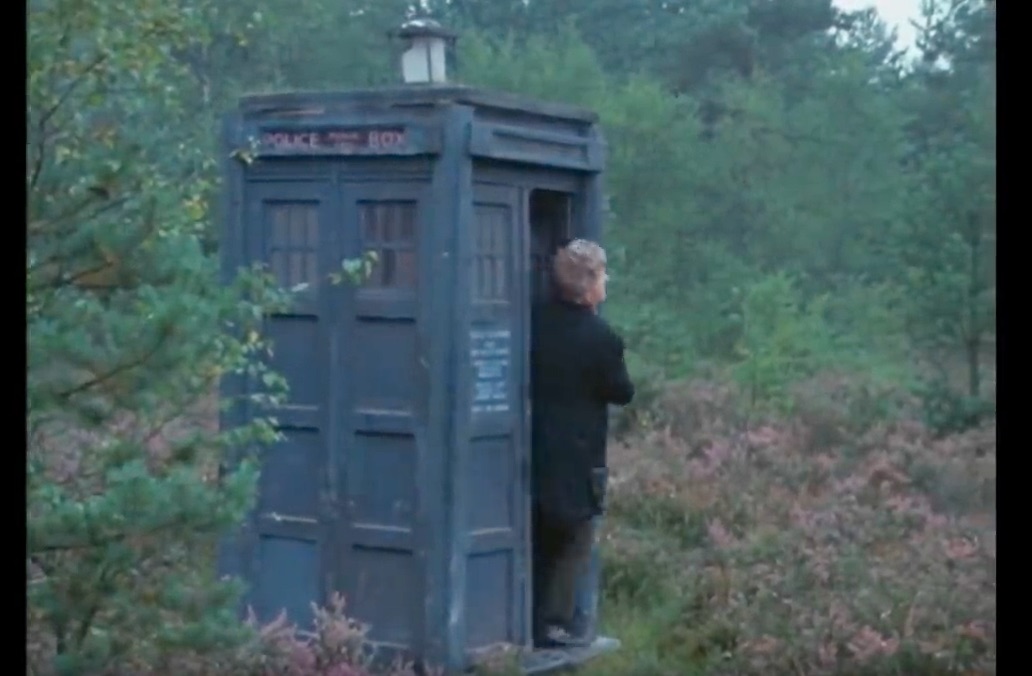; Date: Mon Mar 02 2020
Tags: Doctor Who »»»» Doctor Who Season 12 »»»»
In The Timeless Children we got the reveal promised throughout Doctor Who Season 12. And yes it rewrote Time Lord history from the beginning. But not only did the episode fail on several levels, it is simply a continuation of the over-hype'd role The Doctor has in the universe. The Doctor is supposed to just be a guy, living in a box, carrying a screwdriver, passing through from place to place, and helping out where he (or she) can. But the BBC seems it can't help itself, and has built a bunch of hype about The Doctor. Let's go over the history of that hype bubble.

In Old Doctor Who, a typical story has The Doctor land somewhere, nobody knows who he is, the locals at first distrust him, they might even lock him up, but by the end of the episode arc he will have resolved the issue. In other words, The Doctor was just a traveler with a few companions, passing through, and doing what he can to help out.
By the time we get to Matt Smith's Doctor, it seems the universe is shaking at his fingertips. His TARDIS blew up, destroying the whole universe, and The Doctor had to reboot the universe from a backup tape. At the battle of Demons Run, The Doctor calls on a bunch of allies to conduct a major military operation. Everywhere he goes, The Doctor is not only known, but has a reputation of wiping out whole armies.
Now, in The Timeless Children, the BBC wants us to believe that the whole Time Lord race sprang from The Doctor's DNA. WTF? The Doctor was the key to creating a race of beings that reshaped the whole Universe? WTF?
In this article I want to go over how we got here ... because, history is important.
Hartnell and Troughton - The Doctor is possibly a Human
As discussed in a recent posting, there is a line of reasoning that The Doctor was originally planned to be a human being from an advanced time period: The BBC lied about The Doctor's origin from the beginning?
In episodes of William Hartnell and Patrick Troughton's era, the BBC was cagey about the origin of The Doctor. Various dialog lines in various shows could easily be interpreted as The Doctor being a human from a time period in the far distant future. The Doctor repeatedly talked about being from another time, and not about being from another planet.
In the Second Doctor episode, The Wheel in Space, we saw The Doctor undergo a medical checkup by a medical doctor. In modern Doctor Who, any time The Doctor underwent a checkup the doctor started exclaiming about the strange heartbeat pattern, and The Doctor had to point out that he has two hearts. In The Wheel in Space, we see the medical doctor perform the examination with no notice of any irregularity.
Likewise, in the First Doctor episode, The Time Meddler, we meet another person with a TARDIS. That person is traveling through time meddling with things and trying to get rich. At no time during their interaction did The Doctor or The Meddling Monk discuss being from another planet. Instead it sounded like they were humans from an advanced time period.
In other words, The Doctor was an everyman with a time machine.
The War Games, The Spearhead from Space, and The Third Doctor

This all changed when Jon Pertwee stumbled out of his TARDIS immediately following the events in The War Games.
The War Games was a ten part story that was Patrick Troughton's final episode. The plot centered on various zones where humans were put through battle scenarios from different time periods of earth's history. In the last episode of that story he learned that the people running those "war games" were of his own race - and that they were doing something really bad.
The Doctor at that point had to send a message to his home planet - the first clear statement that The Doctor was not human - and call for help from The Time Lords - the first time they were mentioned.
At the end of the episode, The Time Lords thanked The Doctor for his efforts, they recognized he was right that there is evil in the universe that must be corrected, but that The Doctor would have to spend awhile exiled on Earth.
The next episode, The Spearhead from Space, is Pertwee's first appearance as The Third Doctor. It's also the first appearance of The Autons, FWIW.
From that episode onward Doctor Who started establishing the lore that The Doctor is from Gallifrey, that The Doctor has two hearts, that Time Lords regenerate upon death, and so on. This episode was the first time a medical doctor exclaimed about The Doctor's irregular heart beat, for example. That medical doctor went so far as to claim the radiology department was playing a practical joke on him regarding The Doctor's chest x-ray.
Bottom line is that The Doctor went from being a possible human living in a box traveling around righting wrongs, to a Time Lord living in a box doing those things.
Pertwee, Baker, Davison, Baker, McCoy ... Old Who
In old Doctor Who, that formulation didn't change a whole lot. The Doctor traveled around and was most frequently unknown when he would arrive somewhere. The first episode of an episode arc might center around The Doctor proving himself to the locals so they'll trust him.
The exception is on The Doctor's encounters with The Daleks or The Cybermen. In both cases there had been enough interaction between The Doctor and both foes, that those foes generally recognized The Doctor on sight.
Another exception was the few times The Doctor revisited a place he'd visited before. In such cases there was a barely remembered legend of a traveler who'd helped out previously.
Then there was the bit with The Guardians. The Black Guardian and The White Guardian were presented to us as omnipotent beings that encompassed the entire universe - if you will, they were the Good/Evil archetypes constantly battling one another. They recognized The Doctor as someone worth toying with directly, and in several episode arc's directly engaged with The Doctor for that purpose. The Black Guardian even enlisted one of The Doctor's companions to Kill The Doctor.
Generally, The Doctor remained in the role of Time Lord living in a box, often using a screwdriver, traveling around, and righting wrongs. The Doctor was just one of billions of Time Lords, and one of the few who spent time away from Gallifrey.
McGann - The Eighth Doctor - TV special during the hiatus years
Doctor Who had a hiatus from broadcast TV that began with the end of The Seventh Doctor.
During that hiatus, the BBC and an American group developed a TV Movie with The Doctor played by an American, Paul McGann, and set in America. That meant there was more than a few guns in the episode - such is how Europeans see Americans.
When The Doctor regenerated into Paul McGann's Doctor, there was a moment in the show where The Doctor told someone I'm half human on my mothers side.
Maybe The Doctor was joking, or lying, or possibly telling the truth. It plays into the theory above - that The Doctor was just a human from an advanced time period... etc.
Anyway, nothing changed in the basic premise. The Doctor was still just a person, in a box, with a screwdriver, traveling around, righting wrongs.
Eccleston - The Ninth Doctor
This season had the job of rebooting Doctor Who for a modern audience.
The basic premise was the same - A Time Lord, traveling the universe in a box, carrying a screwdriver, and righting wrongs.
However the big difference is the story of The Time War.
Namely - The Daleks and The Time Lords started a gigantic war that stretched across all of time and space. There was all kinds of atrocities named by The Tenth Doctor - "the Skaro Degradations, the Horde of Travesties, the Nightmare Child, the Could-Have-Been King with his army of Meanwhiles and Never-Weres".
The Doctor, sick of the fighting, is described as having destroyed both Gallifrey and The Daleks in order to put a stop to it.
So... put on your extrapolating caps and ponder ... just how did The Doctor get on with destroying all that? How could a lone Time Lord traveling the universe in a box and a screwdriver pull off a stunt that not even The Daleks could manage?
The history of Doctor Who saw multiple attacks on Gallifrey. The Cybermen invaded, but were pushed away. Daleks attacked Gallifrey, but were pushed away. It was only during The Time War that the Daleks presented a major challenge to The Time Lords.
And - somehow The Doctor was able to, single-handedly, burn both Gallifrey and The Daleks?
Tenant - The Tenth Doctor
For the most part The Doctor was still a Time Lord in a box, with a screwdriver, traveling the universe righting wrongs.
But during Series 4 (2005), when Donna Noble was The Doctor's companion, things began to change. There were several episodes calling out some kind of importance between The Doctor and Donna - with The Ood calling them The-Doctor-Donna as if they're a joint creature.
In Journey's End we saw The Doctor abort his regeneration, sending the regeneration energy into his spare hand. Then when Donna touched that spare hand, her DNA plus the regeneration energy caused the spare hand to grow a whole new Doctor body. Then by the end of the episode, this new Doctor plus Donna Noble were able to do some amazing things, stop the Daleks, send all the planets stolen by The Daleks back to their proper places in the universe, etc.
In other words - The-Doctor-Donna was this galaxy-preserving thing, that the universe was waiting to have happen.
Similar is the the relationship between The Doctor and Rose. It began innocently enough with The Doctor seemingly picking up a girl at random for adventures across time and space. But by the end of The Ninth Doctor's run, Rose had swallowed the Time Vortex at the heart of the TARDIS, and had become The Bad Wolf, also causing a destruction of the Dalek fleet and the whole danger.
During the Tenth Doctor's era, Rose became even more of a galaxy-shaping presence. The first step was her exile into an alternate universe. But then the stars started winking out across that universe. The Torchwood/UNIT equivalent of that universe then created some kind of crude device to jump across universes, allowing Rose to reach her beloved, The Doctor. And, she liked to carry around a really big gun. This was also finished off in Journey's End.
Then - there was The End of Time in which Gallifrey tried to return to the regular universe.
For example, Wilfred Mott (Donna's Grandfather) started having nightmares. He went to a church, where he had a conversation with a woman associated with The Doctor who has never been explained. That woman told us about a legend of the blue box that landed at some monastery hundreds of years ago to drive off a demon. ..etc..etc.. in other words, building up some importance of The Doctor. By the end of the episode The Doctor and The Master collaborated to force Gallifrey to return to Hell (as they called it).
Smith - The Eleventh Doctor
It was during Smith's era that this whole nonsense went overboard.
Smith's Doctor was repeatedly shown landing at places, and immediately being known by the locals because he'd already visited a bunch of times and had advised the leaders on this or that.
For example in Victory of the Daleks, The Doctor and Amy landed in London during The Blitz. They were directly summoned by Winston Churchill, who had a special telephone number he could call to summon The Doctor. As the title suggests, there was some Daleks who The Doctor was able to expose and drive off.
In The Eleventh Hour, The Doctor confronted the evil villain creatures of the episode. He asked them to scan earth's history looking for references to The Doctor. Once they knew who he was, they turned tail and ran away.
In The Pandorica Opens and The Big Bang, The Doctor is such a presence in the universe, that a bunch of races work together to try and capture The Doctor, trapping him in a box that cannot be opened. Everyone - Daleks, Sontarans, Cybermen, and on and on and on, had space ships flying above Stonehenge about 2000 years ago. The goal being The Pandorica, a box that was time locked beyond belief that supposedly nobody could possibly ever open. But The Doctor opened it only to discover that all those enemies had set up that box as a trap to serve as his prison.
Beginning in The Eleventh Hour there'd been a plot point about cracks throughout the universe. Amy Pond's bedroom had one of those cracks, which The Doctor repaired. But there were others, such as the fish people in The Vampires of Venice who followed cracks in the universe to travel from their world to Venice of the 1400's.
Those cracks turned out to be because The Doctors TARDIS had exploded, as shown in The Big Bang. Somehow .. a TARDIS exploding causes the universe to explode? Really? And then, to fix that, The Doctor had to reboot the universe.
So... we've gone from "madman in a box with a screwdriver" to someone who can reboot the entire universe?
But... wait ... that's not all.
In The Impossible Astronaut and Day of the Moon and The Wedding of River Song we learn about a plot by a splinter group of The Papal Mainframe to kill The Doctor. That plot involved training and preparing River Song as an assassin whose mission was killing The Doctor.
But when River Song failed to Kill The Doctor - that caused the entire Universe to collapse.
The failure to kill one person causes the universe to collapse? Really?
The Doctor is that significant to the fate of the Universe? Oh - and The Doctor was able to reboot the Universe once again.
Then in The Name of The Doctor, The Day of The Doctor, and The Time of The Doctor there was more galaxy-shaping things about The Doctor.
For example the blue dude talked about The Oldest Question In The Universe - the question that cannot be answered - "Doctor Who?" In other words, for some reason the blue dude told us that the mystery of The Doctor's real name was the Oldest Question of the Universe.
WTF?
By the end of that story arc, we learned it was because The Time Lords having broadcast that question throughout all of time and space.
The Time Lords still wanted to escape being trapped in the time war.
In The Day of The Doctor, they rewrote the history about The Time War. Instead of The Doctor destroying Gallifrey -- oh, and we learned how The Doctor planned to do it, namely by using one of the secret weapons from the special vault -- The Doctor pulled a fast one and disappeared Gallifrey to a pocket universe in a way that caused The Daleks to destroy each other in the crossfire.
Yeah - we're supposed to believe that The Doctor is such a universe-shaping person.
Then in The Time of The Doctor, there is a strange message emanating from the planet Trenzalore. This is the place the blue dude told The Doctor it would be his last stand, where The Doctor finally dies, on a burned out planet full of dead enemies. Turns out the strange message was a question from The Time Lords - being emanated through a Crack In The Universe, kind of like The Crack from Amy's bedroom. When decoded that message was clear - "Doctor Who"?
Turns out The Time Lords were demanding that The Doctor identify himself before they proceeded with something or other. But the standoff was because Trenzalore was surrounded by a vast armada of all the Doctor's Enemies - kind of like in The Pandorica and Big Bang episodes. So if The Doctor allowed Gallifrey to return through that crack, there'd just be a big war erupt immediately.
Again - The Doctor at the center of a universe-shaping thingymagiggy event.
Capaldi - The Twelfth Doctor
Fortunately, with Capaldi The Doctor returned to a more rational size. He again became a Time Lord living in a box with a screwdriver traveling the universe righting wrongs. There was not so much of this galaxy-shaking nonsense that went overboard during the Matt Smith years.
An exception was The Mummy on the Orient Express. Previous to that episode there'd been messages arriving for The Doctor - like someone calling on the telephone inside The TARDIS - talking about this Mummy. Finally he answered the call, did the events shown in the episode, and took care of the problem.
Another exception came in Hell Bent and Heaven Sent. The Time Lords trapped The Doctor in a so-called confession dial, and he spent five billion years working his way out of the trap. When he finally emerged on Gallifrey, he was able to take a simple moral stand and cause Rassilon to turn tail and run.
Rassilon - the person who's credited (along with Omega) of creating the ability for Time Lords to travel. Who had all kinds of instruments of destruction available to him. One of the most powerful Time Lords, and The Doctor caused him to turn and run.











